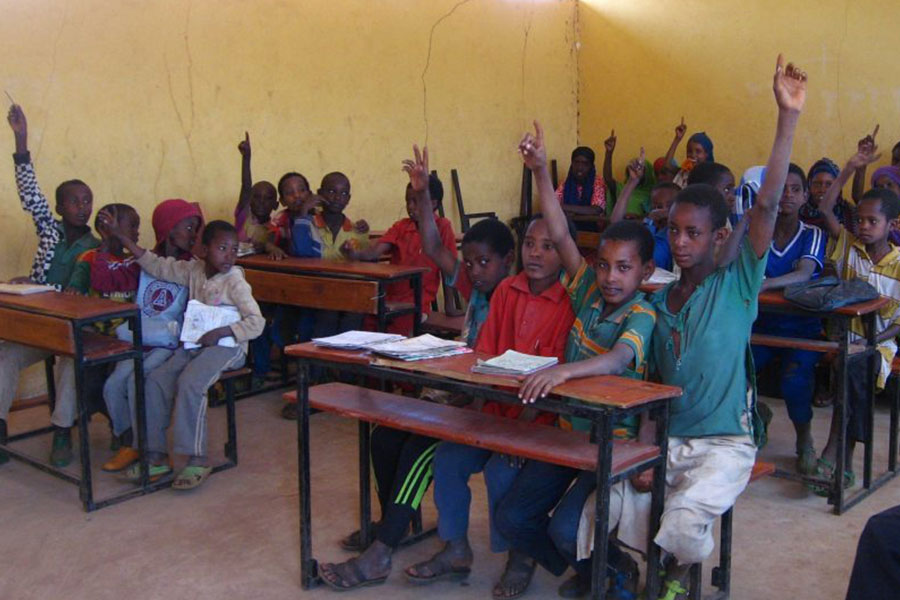
Fortune News | Jul 08,2023
Eden Girma, a 21-year-old architecture student at Wolaita Sodo University in Southern Regional State, dreads her daily trek to the cafeteria. Over the past three years, she has witnessed a steady decline in both the quantity and quality of food served. Meals that once included Rice and Firfir as side dishes three times a week have vanished from the breakfast menu altogether.
"We only get a tiny piece of bread," Eden said.
Lunch and dinner have not fared much better, according to Eden, with portions shrinking and the quality of food deteriorating. In spite of rising food costs, Eden is seriously considering opting out of the on-campus meal plan for her remaining two years.
"It keeps getting worse," Eden told Fortune.
The situation is similar in other universities. With a meagre 22 Br daily budget for a student, public institutions like Wolaita Sodo University, with an annual budget of 1.04 billion Br, are struggling to keep pace with inflation as the cost of essential commodities surges.
A month ago, the 17,000 students who are on-campus meal plan at the University were informed of a menu reduction to cope with rising food costs.
Six months into his appointment as president of the University, Guche Gule (PhD) has found it difficult to balance high food inflation and cafeteria demands. He says the sharp rises in the price of essential commodities like teff, onion and red lentils required a revision to the menu.
"We had to increase the frequency of rice and pasta," Guche told Fortune.
The issue extends beyond shrinking portions and tighter menus. The University’s struggle is emblematic of a nationwide fiscal squeeze faced by the 47 public universities, which find themselves bearing the brunt of an austere government orientation. Federal budgetary allocations have increased in nominal terms by around two billion Br over the past two years, while effectively declining in real terms due to the nearly 30pc inflation rate.
Universities like Arbaminch University, located 500Km from the capital, face difficulties securing basic supplies. Their primary food supplier recently withdrew from their contract due to rising food costs, leaving the university scrambling for alternatives.
Ayelegn Gota, head of Student Services at Arbaminch University, explained that they have resorted to buying directly from vendors until a new tender can be issued. He said it has disrupted established supply chains and requires manoeuvring their already strained 1.2 billion Br annual budget.
"Inflation ate up our food budget," Ayelign said.
Some are taking alternative measures. Dila University, 300Km from the capital, has resorted to reducing the academic year by 15 days, to squeeze the most out of its 925 million Br annual budget.
According to Alemayehu Akalu (PhD), vice president of administration affairs & research at the University, along with 30 million Br supplement from the Ministry of Finance, they have exhausted their 66 million Br allocated food budget within four months.
“Primary culprit is the sharp rise in teff prices,” said Alemayehu.
The University's 10,000 students will face a shorter semester, a measure expected to save around 10 million Br. However, Alemayehu estimates an additional 90 million Br annually would be needed to meet student needs at 64 Br for a student daily. This is nearly three times the current national allocation.
"We are in a difficult place," he said.
The declining quality of food is also impacting student morale. Bemnet Tesfa, a 19-year-old enrolled in the remedial program at Dila University, is reevaluating his future. Having failed to meet the university entrance requirements last year, Bemnet hoped to join the computer science program after completing the preparatory courses.
"I might not continue if things go on like this," he told Fortune, expressing his disappointment with the current situation. Bemnet recently witnessed a student dissent at the cafeteria doors, where students voiced their disapproval about the poor quality of Shiro.
"It was a strange yellow liquid," Bemnet said, "I couldn't bring myself to eat it."
Ethiopia's ambitious expansion of higher education in the last decades created over 47 public universities, increasing access. However, funding for these institutions has not kept pace with rising costs and the growing student population.
Last year, the daily meal allocation for a student was raised from 15 Br to 22 Br, after a decade. The universities' purchasing power and their ability to provide adequate meals for students is further eroded by inflation, estimated by economists like Steven Hanke from Johns Hopkins to be around 60pc, almost double the government's reported rate.
A consortium of public universities is actively lobbying for changes to the food budget. Samuel Kifle (PhD), acting president of Addis Abeba University (AAU), was selected as the Board Chairman last November. He sent a letter to the Minister of Education Birhanu Nega (Prof), highlighting the significant gap between the daily allocation and the actual cost of food.
"Universities are barely functional," said Samuel, comparing the commercial price of a piece of injera now exceeds the daily budget allocated for a student.
While Samuel doubts a simple increase in the current allocation will solve the crisis, he proposes a more targeted approach. He suggests a "scholarship" for underprivileged students, potentially distributing the subsidy burden based on financial need.
Looking towards the long term, Samuel emphasises the need for a complete overhaul of how university subsidies are calculated. Addis Abeba University, which serves up to 20,000 students daily, spends 130 Br for a student (almost six times the national allocation). Samuel described survival as a “magical means.”
“The current system,” he argues, “is unsustainable.”
Officials at the Ministry of Education responded to the Consortium's letter. Minister Birhanu established a committee chaired by Solomon Abraha (PhD), head of Administration & Infrastructure. This committee, comprised of members from four universities, is tasked with creating policies to address the food crisis.
Solomon anticipates a gradual shift towards university autonomy, following a three-month study of 12 universities.
"Several modalities are being considered," he told Fortune.
The Ministry has not ruled out student loans and financial credit systems, common in developed countries, as potential solutions to lessen reliance on subsidies.
Solomon believes university autonomy would offer significant benefits. He said universities would gain the flexibility to admit students based on financial feasibility and potentially become more prudent in managing expenses.
"Long-term solutions are necessary to sustain the budget," Solomon said.
Research from Boston University reveals that inefficient management of scarce financial resources is contributing to the budget deficit faced by Ethiopian universities. The report highlights the mismatch between the limited revenues universities generate and the vast resources needed to support hundreds of thousands of students.
This inherent budget deficit has reached a boiling point. Last year, teachers and technical assistants across multiple public universities went on a five-day strike demanding better wages and benefits, further highlighting the financial strain on the system.
University lecturers like Amitsu Kuma at Wolaita Sodo University fear the diminishing research budget will stifle career advancement opportunities. He said meagre income is overshadowed by the concern that research funding is disappearing altogether.
The proposal for university autonomy is not without its challenges. While Addis Abeba University, with its larger budget of 2.3 billion Br annually, has begun covering 20pc of its expenses, paving the way for autonomy, other universities face a steeper climb.
In Oromia Regional State, 350Km from the capital, Jimma University illustrates the difficulties. Gemechis File (Prof), Vice President of Administration & Development, said campus management was recently forced to divert a 100 million Br research grant to address immediate food shortages for 14,863 students using the cafeterias. This financial strain comes on top of a 60pc reduction in the capital budget, leaving it with only 250 million Br this year.
"We’re stretched thin," he told Fortune. “I hope autonomy brings financial relief.”
The current crisis is the result of a confluence of factors. Experts suggest while the number of new university entrants has declined to around 170,000, likely due to changes in curriculum and exam procedures, it has not resulted in a corresponding decrease in government spending. They criticise the current proposal for autonomy as merely "theoretical" that lacks a practical foundation for success in the local context.
Economist Arega Shumete (PhD) casts doubt on the effectiveness of university autonomy as a solution. He argues that stricter government spending discipline is the more pressing issue. While acknowledging the strain caused by conflict and debt on the national budget, Arega emphasises that education should remain a top priority.
He challenges the current proposal for autonomy as rushed and poorly planned. Unlike countries like Uganda where university autonomy evolved, said Arega, Ethiopia's universities lack the experience and infrastructure to thrive independently.
"No one in the university staff even knows how to get a grant," he said, highlighting their unpreparedness for financial self-sufficiency.
Arega’s biggest concern lies with the potential impact on students. The introduction of tuition fees could discourage many from pursuing higher education, particularly in a country with high unemployment rates. He argues that many students would be forced to drop out, sacrificing their futures due to immediate financial pressures.
For Arega, a long-term solution requires a multi-pronged approach. He recommends improved tax collection to generate more revenues, stricter reforms in public spending management to eliminate waste, and a clear prioritisation of education within the national budget.
With a budget of 801.6 billion Br, the federal government is prioritising austerity measures. Nearly 20pc is allocated to debt servicing, with no new capital projects planned for this year. Tilahun Weldu, budget director at the Ministry of Finance, emphasises the need for fiscal discipline, particularly in an inflationary economy with a staggering 284 billion Br budget deficit. He argues that subsidising universities with "generally poor financial management practices" is unsustainable when the capital budget is already squeezed.
"The economy went through a series of shocks," he told Fortune, "We can’t keep spending money we don't have."
PUBLISHED ON
Apr 28,2024 [ VOL
25 , NO
1252]

Fortune News | Jul 08,2023

Fortune News | Mar 02,2019

Commentaries | Oct 14,2023

Viewpoints | Aug 05,2023


View From Arada | Jun 12,2021

Commentaries | Apr 04,2020

Radar | Apr 02,2022


Viewpoints | Jan 04,2020

Dec 22 , 2024 . By TIZITA SHEWAFERAW
Charged with transforming colossal state-owned enterprises into modern and competitiv...

Aug 18 , 2024 . By AKSAH ITALO
Although predictable Yonas Zerihun's job in the ride-hailing service is not immune to...

Jul 28 , 2024 . By TIZITA SHEWAFERAW
Unhabitual, perhaps too many, Samuel Gebreyohannes, 38, used to occasionally enjoy a couple of beers at breakfast. However, he recently swit...

Jul 13 , 2024 . By AKSAH ITALO
Investors who rely on tractors, trucks, and field vehicles for commuting, transporting commodities, and f...

Oct 11 , 2025
Ladislas Farago, a roving Associated Press (AP) correspondent, arrived in Ethiopia in...

Oct 4 , 2025
Eyob Tekalegn (PhD) had been in the Governor's chair for only weeks when, on Septembe...

Sep 27 , 2025
Four years into an experiment with “shock therapy” in education, the national moo...

Sep 20 , 2025
Getachew Reda's return to the national stage was always going to stir attention. Once...